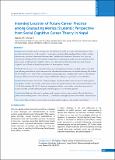Please use this identifier to cite or link to this item:
https://hdl.handle.net/20.500.14356/1865Full metadata record
| DC Field | Value | Language |
|---|---|---|
| dc.contributor.author | Sapkota, B P | - |
| dc.contributor.author | Amatya, A | - |
| dc.date.accessioned | 2023-05-28T07:03:28Z | - |
| dc.date.available | 2023-05-28T07:03:28Z | - |
| dc.date.issued | 2013 | - |
| dc.identifier.citation | SapkotaB. P., & AmatyaA. (2014). Intended Location of Future Career Practice among Graduating Medical Students: Perspective from Social Cognitive Career Theory in Nepal. Journal of Nepal Health Research Council. https://doi.org/10.33314/jnhrc.v0i0.395 | en_US |
| dc.identifier.issn | Print ISSN: 1727-5482; Online ISSN: 1999-6217 | - |
| dc.identifier.uri | http://103.69.126.140:8080/handle/20.500.14356/1865 | - |
| dc.description | Original Article | en_US |
| dc.description.abstract | Abstract Background: Medical workforce shortages and mal-distributions world-wide make understanding how, where and what our future doctors wish to practice is increasingly important. Understanding of factors such as available infrastructure, provision of incentives and many others influences the decisions of doctors to leave or to stay. Therefore the strategies effective for retention, is imperative in conducting the study based on a sound theoretical framework in predicting future medical workforce needs. The study used the theoretical framework of Social Cognitive Career Theory to identify the predictors on future practice location. Methods: The study was cross-sectional descriptive in design targeting the Nepalese medical students in the final year and doing internships in Nepal. Anonymous self administered questionnaire was distributed among 480 students but 393 students were involved due to non response and incompleteness. Findings of the study were presented in frequency tables for univariate descriptive analysis and bivariate findings were presented by cross tabulation. Results: About two thirds 259 (65.9%) of the participants had chosen within country location for future practice. Among those who had chosen within country choice, about an equal percentage of the respondents had chosen rural 131 (50.8%) and urban 128 (49.2%) location. Among those who had chosen within country for future practice location, less than one fifth of the participants had chosen private sector for future practice. Conclusions: Majority of the medical graduates wish to practice within country location. Most of which chose public sector for future practice. None of the SCCT construct had any significant association within country location. Keywords: Choice of future practice; choice of location; medical students; socio cognitive career theory. | en_US |
| dc.language.iso | en | en_US |
| dc.publisher | Nepal Health Research Council | en_US |
| dc.relation.ispartofseries | Sep-Dec, 2013;395 | - |
| dc.subject | Choice of future practice | en_US |
| dc.subject | Choice of location | en_US |
| dc.subject | Medical students | en_US |
| dc.subject | Socio cognitive career theory | en_US |
| dc.title | Intended Location of Future Career Practice among Graduating Medical Students: Perspective from Social Cognitive Career Theory in Nepal | en_US |
| dc.type | Journal Article | en_US |
| local.journal.category | Original Article | - |
| Appears in Collections: | Vol. 11 No. 3 Issue 25 Sep - Dec, 2013 | |
Files in This Item:
| File | Description | Size | Format | |
|---|---|---|---|---|
| 395-Article Text-478-1-10-20140207.pdf | Fulltext Download | 293.95 kB | Adobe PDF |  View/Open |
Items in DSpace are protected by copyright, with all rights reserved, unless otherwise indicated.
